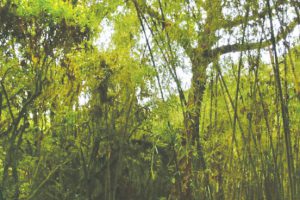The Ethiopian Orthodox Church has more than 65,000 Churches and Monasteries, 75 % of the Monasteries are endowed with forests that rest on over 1-4,000 hectares of land. These forests have been managed and protected by Church communities who reside in and around the churches and Monasteries.
The Church has long history and experience in conserving and managing Church forests. That have vital role for conserving the environment. “Based on its religious thought, the church can conserve forests in side and around its compound,” said His Grace Abune Samuel Archbishop of Ethiopian Orthodox Church Development and Inter-Church Aid Commission (EOC-DICAC).
EOTC has received recognition for its long-standing tradition of conserving wide variety of trees in the compounds of its parishes and monasteries. The church preaches its parishes that the forests in churches compound are unique and saints coupled with teaching the church’s Saint Materials are made from this forests.
His Grace also quoted Biblical verse to strengthen the above idea. Deuteronomy 20:19 “When you besiege a city for a long time, making war against it in order to take it, you shall not destroy its trees by wielding an axe against them. You may eat from them, but you shall not cut them down. Are the trees in the field human, that they should be besieged by you?
According to Abune Samuel, church forests have different functions. First they have spiritual and cultural functions as a place of worship, shade for prayers, serve for a cemetery and a place of education (Ezekiel 20:47 and Psalms 96:12).
And also they have ecological function. They are important for the protection of water resources and prevent land degradation. They also serve as habitat for plants, animals, insects and micro-organisms coupled with serving as a genetic reserve and improve micro-climate and have ecosystem functions.
Socio-economic functions are also the major importance of church forests. They are sources of wood for various purposes example for construction. Serving as medicinal values (for human and livestock), source of essential oil source, food and feed for livestock and human and mother trees (seed sources).
They are also potential for non-timber forest products (beekeeping, gum etc) besides serving for ecotourism and research. Keeping indigenous trees also the other advantage of the church forest program.
According to Yilikal Shiferaw, Commissioner of EOC-DICAC; deforestation, lack of boundary and land ownership and low regeneration are some of the challenges in forest development. He also stated that farmland expansion, free grazing, fire wood, mining and construction, hunting and wild fire are the major causative factors of deforestation.
“Therefore, to rescue the remaning Church forests on the one hand and to improve the livelihoods of the communities living in and outside the Church forests on the other; Church forest and livelihood improvement project has been initiated in 19 Church Forests (13 CFs with PADD and 6 CFs with NCA)” Yilikal added.
According to him, this CFs has a total of 3,149 hectare (2,834 hectare in PADD financed projects and 315 hectares in NCA supported projects. While the total number of project beneficiaries are 103,363 people. The total budget of the project is amount to 109,790,092 ETB (86,062, 437 Birr from PADD and 23,727,655 from NCA)
As part of the project the church has planned to plan more than 7 million seedlings by this rainy season. And since the launching of the national green legacy campaign by the Prime minister, the commission has planted about 3 million seedlings up to now, he added.
Tewaney Seifesellassie, program officer at the commission on his part said that the commission is working on six monasteries to in benefiting residents in creating job opportunity in line with conserving trees.
The project aims to produce sufficient products even in a small area of land. It also helps the community to keep themselves from deforesting trees. Because they can produce products for their daily life and basic needs, he added.
As to him, the plantation helps societies to get good atmosphere on their compound apart from safeguarding the protected forest areas among the churches and monasteries. It is also vital to save the forests and improve economic status of the surrounding societies in engaging on different activities.
Nationally, EOC-DICAC operates in all regions including Addis Ababa and Dire Dawa. The commission will further strengthen its role by drafting different projects, the Commissioner noted.
DICAC cooperates with zonal and woreda (district) bureaus for: health; finance and economic development; water and irrigation; agriculture; women, children and youth affairs; justice and offices for: savings and cooperatives, micro-finance and small enterprises and other relevant government bodies, it was learnt.
The Ethiopian Herald July 25/2020
BY HIZKEL HAILU



